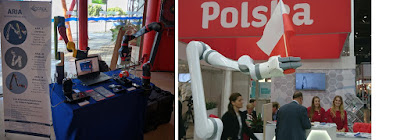ARIA-Medical: affordable solution from Accrea
ACCREA "is a
research-oriented company from the prestigious TUM, and has many years of experience in the fields of robotic,
control and systems engineering. ACCREA Engineering was established in May 2007. We
are a young company specialized in designing and manufacturing of
various prototypes according to the customer specifications. ACCREA is a
multidisciplinary (mechanical engineers, electronic engineers, software
engineers, skilled technicians, marketing specialists and graphic
designers) and multilevel (technicians, engineers, PhDs) team proficient
in Solidworks, SolidCAM, Matlab, Simulink, Control System Toolbox. ACCREA is equipped with
modern mechanical and electrical workshops (precise CNC routers,
Laser-cutters) for manufacturing, assembling and testing of prototypes
and small runs." Lately, you could meet them at the ERF2020, Malaga.
The company offers a certified lightweight arm for medical device integration.
"ARIA-Medical can be equipped with a needle to support biopsies, or with an endoscope or a retractor to support surgeries. The intelligent guidance of the needle, the endoscope or the retractor increases the efficiency of procedures and surgical interventions, and – in case of CT supported procedures – reduces doctors’ exposure to radiation. Moreover, the arm can be operated remotely helping doctors to perform telemedical diagnostics in remote locations from their home hospital. Robotic arm is avaliable in version ARIA v1: Kinematics 6 DoF, weight 7 kg, payload 2 kg, reach 900 m, repeatability 1 mm, lightweight carbon fiber structure, multifunctional tool e.g. USG probe, to be integrated into a medical product, sensitive & safe, 7DoF versions are also possible."
ACCREA ENGINEERING has also been part of the ReMeDi project before: "In the frame of the project ReMeDi a robot system is designed that
features medical tele-examination of patients. Successful medical
treatment depends on a timely and correct diagnosis, but the
availability of doctors of various specializations is limited,
especially in provincial hospitals or after regular working hours.
Medical services performed remotely are emerging, yet current solutions
are limited to merely teleconferencing and are insufficient."



Comments
Thanks for an information based post.These tips are really helpful. Thanks a lot.
text messages service
text message business
business text messages
text for business
gateways sms
send text messages
online text message sender
online send sms
text sms
sms for marketing
sms marketing services
bulk sms
bulk text message
sms service provider